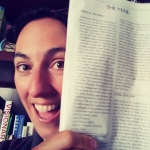In the Field: Deliana Garcia at Union World Conference on Lung Health

Tuberculosis continues to kill two million people each year -- and that’s two million too many. This ancient disease, which is inexpensive to treat and cure, has been a focal point of Migrant Clinicians Network from our founding in the mid-80s, including through our bridge case management program, Health Network. But migrants haven’t always been identified as a key population in the fight against TB. This is starting to change, says MCN’s Deliana Garcia, who spent the last week with over 3,000 TB and lung disease health advocates from 126 countries for the 47th Union World Conference on Lung Health, which was held this year in Liverpool, England.
“It was very gratifying to see how broadly migrants are being incorporated into the entire discussion within the Union, and the wide perspective that people are taking now on the impact of migration on TB,” Garcia said via Skype while en route back to MCN’s Austin, Texas headquarters. Garcia is MCN’s Director of International Projects, Research, and Development, and has been closely involved with the Union’s TB and Migration Working Group for over 20 years, but she admits that she’s never seen the topic of migration brought into the central dialogue at the Union, until now. Plenary sessions, multiple symposia, and posters all incorporated the migrant clinician’s viewpoint.
“Those of us who have been working in this field for a good many years… have looked to the Union as a place to have these conversations [about TB and migration] and to find kindred spirits,” Garcia noted, praising the Union’s longtime facilitation of the migrant-TB conversation. “But as the issue of migration has started hitting the news, with horrible images of children lost, and the increased flow of people from one place to another -- for whatever the reason -- the issue of migration has become clear in people’s consciousness,” increasing the urgency of addressing TB among migrants, Garcia said.
Garcia facilitated a review of two case studies during a Wednesday workshop entitled, “Building capacity for increased attention and support for integrating migrants and mobile populations in national and international TB programmes.” The well attended workshop featured presentations by International Organization for Migration (IOM), Stop TB Partnership, and the Global Fund, followed by case studies reviewed through the lens of gender, and again through a legal lens, to better understand migrants’ TB experiences through different frameworks. Over 80 people were in attendance, and many stayed afterward to discuss, a strong indication that the topic resonated with its audience, Garcia pointed out. During the conference, Garcia also offered up two posters featuring Health Network as a model, including one highlighting MCN’s recent work with the University of Arizona that enrolled mobile patients with TB into Health Network, and a third poster that she presented on behalf of our colleagues.
By the end of the weeklong conference, Garcia was still energized by the new turn toward the migrant cause, despite 10-hour days in which sessions rolled forward at 7:45 in the morning. Garcia was equally enthused by new interest she received in Health Network, from countries encountering the same issues that recognize the program as a model for addressing TB among migrants.
You can view the complete program and see lots of photos and updates from the floor of the conference on the Union’s conference website, http://liverpool.worldlunghealth.org/.
Like what you see? Amplify our collective voice with a contribution.
Got some good news to share? Send it to us via email, on Facebook, or on Twitter.
Return to the main blog page or sign up for blog updates here.
- Log in to post comments






